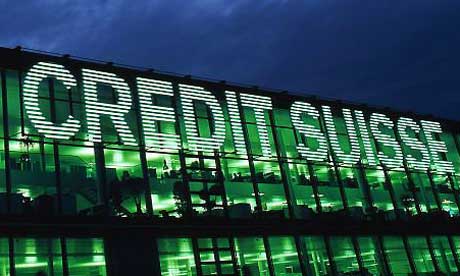
Credit Suisse, the Swiss bank, has warned investors against buying shares in Greek banks. It was a conclusion reached after lengthy analysis of bank reserves, likely profits and relationship to the ailing Greek economy. But it hardly seemed necessary – there can be few investors queueing up to add Greek bank stock to their portfolio.
That is the case for most European banks. Share prices have dived since last year and despite a few mini rallies, remain depressed. In March Credit Agricole shares topped €12; last week they were just above €6. BNP Paribas shares have slumped from €58 to €32.
The comments of Christine Lagarde, head of the International Monetary Fund, will have done little to calm jittery nerves. She said Europe's banks needed to call on their shareholders for more money to boost their capital buffers and prevent another credit crunch tipping them into bankruptcy.
UK banks are in the same boat. Lloyds Banking Group, which includes Halifax, went above 78p a share last September. Last week it was trading down 56% at 28p. Barclays reached a post-crash peak of 377p in August 2009 and remained above 300p until April this year when it began a slide that leaves the bank stock now struggling at 145p.
But it is the German institutions that have taken the greatest pounding. Commerzbank, Germany's second largest bank, has lost two thirds of its value since March when its share price stood above €6. Its larger rival,Deutsche Bank, has dropped almost 50% from a high of €50 to less than €27 a share.
Analysts argue the German banks face a three-way squeeze. Holdings of financial instruments have been left almost worthless by the Greek crisis. In the never-ending chain that is modern capitalism, German banks have lent funds to institutions that in turn hold Greek sovereign and corporate bonds and other financial instruments such as credit default swaps that insure transactions by Greek companies.
Secondly, there is the struggle to improve profits when European economies are slowing. And thirdly, there are the difficulties faced by the government now most investors believe Berlin will find itself insuring the debts of most peripheral eurozone countries within the next couple of years, whether the German electorate likes it or not.
The generally held view that Greece, Portugal, Spain and Italy will need vast amounts of financial aid from Berlin via the European Central Bank's lending facility has sent the cost of insuring German sovereign bonds soaring and had knock-on effects for banks.
Investors are expected to remain wary of supporting European banks while politicians wrangle among themselves over the extent of the Brussels' bailout fund, the European Financial Stability Facility.
The US has similar difficulties. Bank of America, the largest bank in the US, has seen its share price halve this year to less than $8. Before the crash its value was based on a share price north of $50. Citigroup has dived from $50 to $30 a share and Wells Fargo, considered one of the better capitalised banks, has dropped from $34 to $24 a share.
As in many western countries, many of the worst-hit financial institutions remain in government hands. The biggest mortgage lenders in the US, Fanny Mae and Freddie Mac, are still government owned and in effect bust without federal support.
Germany's Hypo Real Estate bank is in government hands after a €50bn bailout and the UK's Royal Bank of Scotland and Lloyds are still partly nationalised. French banks have escaped, though analysts remain nervous that lending to Latin countries leaves them vulnerable to default.
Warren Buffett, the maverick US investor, has stepped in with a $5bn investment to boost Bank of America's reserves. He expects to make a sizeable return on his capital much as he did following a $10bn injection into Goldman Sachs at the height of the crisis in 2008. But most investors are expected to wait for an economic upturn and political resolution before following his example.
Guardian
hostgator coupon 2011
No comments:
Post a Comment